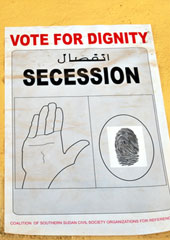To Secede or Not to Secede? The Case of Sudan and Beyond
Do the secessionist impulses that threaten to break apart troubled African countries make economic sense?
May 11, 2012

A January 2011 article on ForeignPolicy.com by Parag Khanna, enticingly titled “Breaking Up Is Good to Do,” argued not only that the break-up of countries is picking up steam again, but that in many cases secession is good rather than bad.
Secession is supposed to solve otherwise intractable political problems without imposing too many economic costs because, in the age of globalization, “borders are practically irrelevant.”
Khanna suggests that 30 to 40 of countries are worth splitting up or otherwise restructuring. He and others see it as a natural consequence, especially for countries in Africa and the Middle East that emerged out of the dissolution of European and Ottoman empires in the 20th century.
However, both the scope of this argument and the incompleteness of its logic combine to make it worth rebutting. To see why, let’s focus on Africa, where, prior to Sudan’s partition, nine of the world’s 13 most “artificial states” — defined in terms of both ethno-linguistic fragmentation and straightness of borders — were concentrated.
What were those troubled 13 countries? Based on an analysis by Alberto Alesina, William Easterly and Janina Matuszeski, nine of them were in Africa: Chad, Equatorial Guinea, Eritrea, Mali, Morocco, Namibia, Niger, Sudan and Zimbabwe. The other four were Ecuador, Guatemala, Jordan and Pakistan.
To start with Sudan, perhaps the situation there was indeed irremediable given the ongoing civil war. But the continuing violence in the disputed Abyei region is a reminder that the decision to erect national borders between warring parties is not a political panacea.
After all, agreement must still be reached on the often-difficult decision about where to draw those borders. And even though an agreement on where to draw the line in the sand between Sudan and South Sudan has been reached on paper, fundamental economic problems remain and require coordination. For instance, South Sudan has much of the oil, but the pipeline that would allow it to access markets runs through the north.
Furthermore, it is a dangerous oversimplification to characterize the problem with Sudan as just a religious fault line dividing Muslims in the north and Christians and animists in the south.
Most people probably remember the genocide in Darfur (on the northern side of the border), where both sides share the same religion (Islam). But not as many have taken note of the current conflict between the Lou Nuer and the Murle within South Sudan (which claimed 1,100 lives in 2011)?
Or to cite another example on the northern side of the border, what about the fighting in 2009 and 2010 between the Misseriya and the Rizeigat in South Kordofan?
These other conflicts point to a broader problem with the blunt instrument of secession. Groups in conflict seldom divide up cleanly across geographic lines. Witness the UN reports that “more than 350,000 southerners have moved to South Sudan since October 2010 after decades living in the north, but some 700,000 southerners remain.”
To be sure, Sudan is an extreme case — even among the 13 most artificial states — in terms of the degree of armed internal conflict there. Only one other country on that list, Chad, was listed as recently being subject to an ongoing civil war by the Center for Systemic Peace.
In most of the countries in Africa where secession is proposed, poverty trumps violence as the most immediate challenge. Economic growth, the required elixir, would be strengthened by more integration, rather than the fragmentation that secession would engender.
Africa ranks poorly on virtually every measure of international integration. Sub-Saharan Africa, for example, scored the second-lowest among the world’s regions in terms of the depth of its trade, capital, information and people flows, as measured by the 2011 DHL Global Connectedness Index (which I prepared). As a reasonable rule of thumb, a new border will slash the trade across it by two-thirds.
One of the reasons that Africa has lagged other regions in terms of economic development is its geography. The continent as a whole is very far from major world markets.
When one divides foreign market sizes by geographic distance (based on the rough approximation that doubling the distance between countries cuts their trade in half) and adds them up, sub-Saharan African countries can access one-third the foreign demand that European countries can.
And even without adding more borders through secession, Africa already has a disproportionately large number of landlocked countries, hampering its access to foreign markets.
Mali, which is one of the 25 poorest countries in the world, exemplifies the problems faced by Africa’s landlocked countries particularly well. In addition to gold mining, Mali is heavily dependent on agricultural exports, given that 80% of its labor force is engaged in farming and fishing.
While a recent coup and terrorism in the north’s arid Saharan zone have generated headlines and hurt tourism, the biggest economic problem Mali faces has to do with strife in the Ivory Coast, its traditional lifeline to the sea (via the Niger River) from the time when both countries were French colonies. A new rail line to Senegal provides some relief, but the trains take days to cover the thousand-odd kilometers between Bamako and Dakar.
While Mali continues to suffer from tribal and religious tensions, it is hard to see how splitting the country up would ameliorate the grinding poverty that overshadows most aspects of existence there. Rather, what seems to be required is better integration with neighboring countries and opening up borders and barriers, rather than erecting new ones.
The importance of intra-regional trade
Inadequate transportation infrastructure severely worsens Africa’s geographic challenges, and is an area in which improvement efforts should be focused.
African exports to the United States incur shipping costs three times as high as those from developed countries, and landlocked countries incur inland transport costs four times higher than coastal countries in the region.
The difficulties of coordinating infrastructure development across countries suggest that this is another problem that secession would amplify.
The deficiencies of Africa’s physical infrastructure are also compounded by corruption at the dozen or more checkpoints that tend to crop up along roads between one capital city and another. More national borders and more governments, of course, would mean more checkpoints.
![]()

Eastward flow of trade. The countries on this map have been re-sized to reflect the size of their bilateral trade with Sudan. (Credit: Pankaj Ghemawat)
![]()
Particularly in the context of debates about secession, Africa’s very low level of intra-regional trade is a concern worth emphasizing. According to the World Trade Organization (WTO), 88% of Africa’s merchandise exports went to non-African buyers in 2009, compared to only 38% intercontinental trade in Europe, 48% in Asia, and 52% in North America. (The paucity of Sudan’s trade with the rest of Africa is vividly illustrated in the figure above.)
This reflects, in part, the legacy of infrastructure investments by former colonial powers. They were more interested in efficiently extracting natural resources than in facilitating internal or intra-regional trade.
But since neighboring or close-by countries tend to share a host of cultural, administrative, geographic and economic similarities, Africa is missing out on the significant efficiencies countries gain when they trade intensively with their neighbors.
The importance of intra-regional trade in Africa is heightened by the fact that many African economies are already considered too small to be economically efficient.
Further subdividing sub-scale economies and erecting new barriers between them and what might become their most promising markets in the future hardly seems like a recipe for the economic development Africa desperately needs.
A rough analysis of WTO disputes seems to indicate that economic engagement and military trouble are substitutes. That, along with a sense that prosperity can help temper xenophobia, suggests that the economic benefits of integration — as opposed to secession — might even help ameliorate some of the continent’s underlying political conflicts over the long run.
Takeaways
In most of the countries in Africa where secession is proposed, poverty trumps violence as the most immediate challenge.
Africa has lagged other regions in terms of economic development because of its geography. As a whole, the continent is very far from major world markets.
Africa is missing out on the significant efficiencies countries gain when they trade intensively with their neighbors.
An analysis of WTO disputes seems to indicate that economic engagement and military trouble are substitutes.
